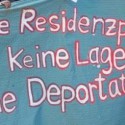Tag: refugee camps
-
Justice for Rita!
von Kommon Beitrag zum feministischen Kampftag: Justice for Rita! Im Jahr 2019 wurde Rita Awour Ojunge ermordet. Jetzt soll das Vermittlungsverfahren von heute auf morgen eingestellt werden, ohne dass eine Aufklärung stattgefunden hat.
-

Conference on the Sudanese refugees’ situation in Germany (31 January at 21:00 on Skype)
Update 3 On 31/1/2021 at 21:00 we have a continuation of a workshop about Sudanese refugees from Schaumberg/Niedersachsen online to discuss the refugee’s situation. This is the 4th workshop now. We are not going to be silent, until the deportation is stopped, until the isolation of refugees is broken, and until the primary, secondary, and universal…
-
Impressions of the expert conference “Protection of Refugees against gender-based Violence”
text in german by International Women’s Space There are two forms of violence, according to Jennifer Kamau, an activist of International Women’s Space Berlin, a political group. The first form hits people directly and comes from individuals and structures, while the second form occurs when the public looks away and stays silent. The latter is…
-
w2eu Statement 22.01.2017: No Dublin Returns to Greece!
‘One step forward, hundreds back…’ seems to be the motto under which EU experts implement refugee policy, as currently also demonstrated in Greece. On 8 December 2015, the European Commission published its fourth recommendation on the resumption of Dublin Returns to Greece, this time stating that they could be gradually re-installed, as according to them,…